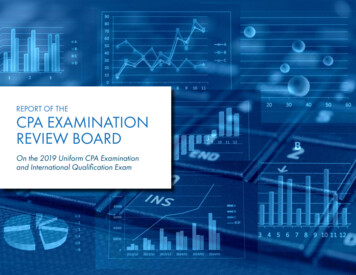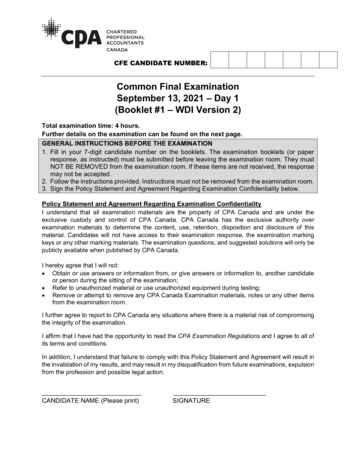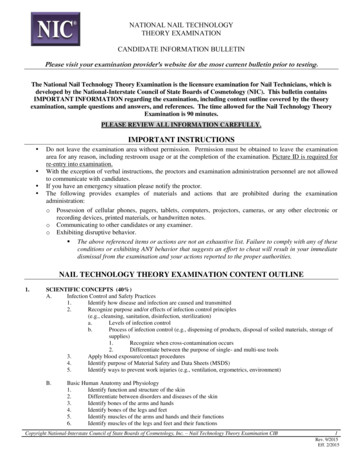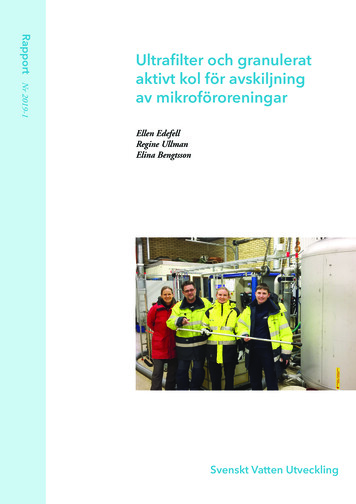
Transcription
EDUCATION AND EXAMINATION CODE FOR DOCTORAL MATTERSACADEMIC YEAR 2021-2022This English translation of the Education and Examination Code for Doctoral Matters isprovided as a service to the foreign-language students and staff of Ghent University. Nowarranty of any kind, either expressed or implied, is made as to the accuracy, correctness, orreliability of this translation. Discrepancies in this translation are not binding and have no legaleffect for compliance or enforcement purposes. If any questions arise related to the accuracyof the information contained in this translation, please refer to the official Dutch version thatwas approved by the Board of Governors on 7 May 2021.FACULTY REGULATIONSThe doctorate and the doctoral training programmeat the Faculty of Engineering and Architecture(August 2021)The complementary faculty regulations are added in italics.Table of contentsPART I: PREAMBLE .4SECTION I: ACRONYMS AND ABBREVIATIONS . 5SECTION II: LIST OF DEFINITIONS. 7PART II: INTRODUCTORY PROVISIONS . 16Article 1 Education and examination code for doctoral matters . 16Article 2 Language requirements . 16Article 3 Language of instruction . 18PART III: THE PREDOCTORAL TRAINING PROGRAMME . 19Article 4 Definition . 19Article 5 Admission requirements for the predoctoral training programme. 19Article 6 Enrolling in a predoctoral training programme . 20Article 7 Persons with a final diploma awarded by a foreign higher education institution . 20Article 8 Initiative and approval. 201/82
Article 9 Assessment of the predoctoral training programme . 21Article 10 Qualification and certification framework. 22Article 11 Quality control . 23PART IV: THE DOCTORATE AND THE DOCTORAL TRAINING PROGRAMME . 24Section 1: Administration and reporting . 24Article 12 Admission requirements for the doctorate and the doctoral training programme24Article 13 Application for the first enrolment for the doctorate and the doctoral trainingprogramme 25Article 14 First enrolment for the doctorate and the doctoral training programme . 27Article 15 Guidance of doctoral students . 28Article 16 Data management . 29Article 17 Requirements regarding property rights and valorisation . 30Article 18 The self-reflection report . 30Article 19 Re-enrolment for the doctorate and the doctoral training programme. 32Section 2: The doctoral training programme . 32Article 20 Definition of the doctoral training programme. 32Article 21 Curriculum of the doctoral training programme . 33Article 22 Enrolment for components of the doctoral training programme . 36Article 23 Description of the components of the doctoral training programme . 37Article 24 Evaluation of components of the predoctoral training programme and the doctoraltraining programme . 39Article 25 Assessment of the doctoral training programme. 41Section 3: The doctoral exam . 42Article 26 Submission of the doctoral dissertation and enrolment for the doctoral exam . 42Article 27 Examination board for the doctoral exam . 43Article 28 The doctoral exam . 46Article 29 The examination board’s first assessment of the doctoral dissertation . 46Article 30 The public defence of the doctoral dissertation . 48PART V: THE INTERDISCIPLINARY DOCTORATE . 51Article 31 Subject, scope and criteria interdisciplinarity . 51Article 32 Request for the acquisition of a combined doctoral degree . 51Article 33 Admission procedure, agreement and enrolment . 52Article 34 Interim evaluation and termination . 52Article 35 Admission to the doctoral exam and examination board . 53Article 36 The procedure of the doctoral exam . 53Article 37 The awarding of the diplomas . 53PART VI: THE JOINT DOCTORATE . 55Article 38 Subject and conceptual framework . 55Article 39 The agreement . 55Article 40 Supervision of the doctoral student . 56Article 41 Communication. 56Article 42 Admission to the doctorate . 57Article 43 Enrolment, tuition fee and bench fee . 57Article 44 Doctoral training programme . 58Article 45 Research stay and research periods . 582/82
Article 46 Financial provisions . 58Article 47 Insurances . 58Article 48 Protection of the research results and intellectual property rights . 59Article 49 Confidentiality . 59Article 50 Publications . 59Article 51 Language and layout of the doctoral dissertation . 59Article 52 Admission to the joint doctoral exam . 59Article 53 Joint examination board . 60Article 54 Joint doctoral examination . 60Article 55 The awarding of diplomas. 61Article 56 Dispute settlement . 62Article 57 Validity period, amendment and termination of the agreement . 62Article 58 Signing of the agreement by and approval of agreements at Ghent University . 62PART VII: SPECIAL CIRCUMSTANCES. 63Article 59 Reconsideration of exam decisions . 63Article 60 Fraud or irregularities in the predoctoral training programme, the doctoral trainingprogramme and the doctorate . 63PART VIII: ORGANISATION OF AND FRAMEWORK FOR THE DOCTORAL SCHOOLS . 67Article 61 Definition of Doctoral Schools . 67Article 62 Role of the Doctoral Schools . 67Article 63 Operational tasks of the Doctoral Schools . 67Article 64 Costs and compensations . 68Article 65 Governance of the Doctoral Schools . 69Article 66 Doctoral Schools Steering Committee . 70Article 67 Board of Directors . 70Article 68 Doctoral School Councils . 71PART IX: CONCLUDING PROVISIONS . 73Article 69 Amendments to the education and examination code for doctoral matters . 73Article 70 Departures from the education and examination code for doctoral matters . 73Article 71 Specific examination code for study programmes organized in conjunction withdifferent institutions of higher education . 73Article 72 Implementation of the education and examination code for doctoral matters . 73PART X: REGULATIONS CONCERNING THE STORAGE OF DOCUMENTS . 74PART XI: STUDENT ASSISTANCE AND STUDENT SERVICES . 753/82
PART I: PREAMBLE§1. On the date of approval of the Education and Examination Code for Doctoral Matters 20212022 by the Board of Governors, the doctoral process at Ghent University – in addition to theaforementioned Code – is also governed by: the general Education and Examination Code 2021-2022; the electronic course catalogue; the Rules of proper use of Ghent University network and the computers controlled by DICT,as approved by the Executive Board on 15 May 2017; the Code of Conduct pertaining to learning analytics at Ghent University, as approved bythe Executive Board during the meeting on 9 March 2021; the regulation pertaining to the appointment of lecturers and co-lecturers for the course unitsand their temporary replacement, as approved by the Board of Governors (see part XII ofthe general Education and Examination Code 2021-2022); the regulations about valorisation within Ghent University, as approved by the ExecutiveBoard during the meeting on 18 November 2016; the higher education admissions policy, as approved by the Board of Governors on 15 April2005; the procedure on previously acquired competencies, as approved by the Executive Boardof the Ghent University Association on 7 June 2005; the Disciplinary Regulations for Students, as approved by the Board of Governors on 19September 2008; Ghent University Association regulations on the special admission requirements, asapproved by Ghent University Association’s Management Committee on 25 April 2007; the regulations about the lifelong learning courses at Ghent University, as approved by theBoard of Governors during the meeting on 8 January 2021; the resolution pertaining to the organisation of permanent training and postgraduateprogrammes (including predoctoral training programmes), as approved by the ExecutiveBoard during its meeting on 25 February 2010; the General Research and Collaboration Regulations, as approved by Ghent UniversityAssociation’s Board of Governors during its meeting on 18 December 2020; the Regulations pertaining to the procedure to investigate breaches of academic integrity,as approved by the Executive Board on 15 February 2019 and amended on 16 January2021; the Generic code of conduct for processing personal information and confidentialinformation, as approved by the Executive Board during its meeting on 18 May 2018; the Policy of Ghent University pertaining to inappropriate behaviour, as approved by theBoard of Governors during its meeting on 28 September 2018; the Non-discrimination declaration, as approved by the Board of Governors during itsmeeting on 27 May 2011; the Framework for Good Research Practice; the Quality Framework for Doctoral Research, as approved by the Board of Governors on 8May 2015; the Charter for doctoral students and supervisors, as approved by the Executive Board on26 May 2015.§2. The Education and Examination Code for Doctoral Matters is subject to the Codex of 11October 2013 concerning Higher Education, ratified by the decree of 20 December 20134/82
(Codex Higher Education), and to the following decrees adopted by the Flemish Parliamentand resolutions adopted by the Flemish Government: the special decree pertaining to Ghent University and Antwerp University Centre, asapproved on 26 June 1991; the resolution of the Flemish Government establishing the list of the Bachelor’s and Master’sprogrammes for each institution in Flemish high education, as approved on 30 March 2018; the resolution of the Flemish Government establishing the form of the higher educationdiploma and the content of the accompanying diploma supplement that is awarded by highereducation institutions in Flanders, as approved on 12 December 2014; the decision of the chair of the Programmes Committee to amend the curriculum of GhentUniversity’s doctoral training programme and to make this decision compliant with theaforementioned code pertaining to the PhD completion bonus, which was made on 22 June2016, following the Programmes Committee’s favourable recommendation on the matter onthe same date; the resolution of the Flemish Government establishing the regulations pertaining to thepreparation of annual reports made by universities in the Flemish Community, made on 4February 1997; the resolution of the Flemish Government, made on 20 October 2000, establishing thelevels, the degrees, and the correlating salary scale of the administrative and technical staffof the universities in the Flemish Community, as amended on 28 February 2007.§3. The Education and Examination Code for Doctoral Matters is supplemented by the facultyspecific doctoral regulations and Faculty regulations.§4. By requesting (re-)enrolment, students declare themselves to be in agreement with thestipulations of the current Education and Examination Code for Doctoral Matters and thegeneral Education and Examination Code.SECTION I: ACRONYMS AND ABBREVIATIONSAAPAssistant academic staff (assisterend academisch personeel)AOSRGeneral Research and Collaboration Regulations of the Ghent University Association(Algemeen Onderzoeks- en Samenwerkingsreglement van de Associatie Universiteit Gent)AUGENTGhent University Association (Associatie Universiteit Gent)DMPData management planDPODepartment of Personnel and Organisation (Directie Personeel en Organisatie)DSODoctoral Schools OfficeECTS5/82
European Credit Transfer and Accumulation SystemEEA/EEREuropean Economic Area (Europese Economische Ruimte)EVCPreviously acquired competencies (Eerder verworven competenties)EVKPreviously acquired qualifications (Eerder verworven kwalificaties)FDOFaculty office of Educational support (Facultaire Dienst Onderwijsondersteuning)FSAFaculty student administration (Facultaire Studentenadministratie)ICPInternational Course ProgrammeKMS/RMSRoyal Military School (Koninklijke Militaire School)MAMaster’s programmeMANAMAAdvanced master’s programmeOAPOther Academic Staff (Overig academisch personeel)OASISStudent administration platform (Onderwijsadministratie- en studenteninformatiesysteem)OEREducation and Examination Code (Onderwijs- en Examenreglement)UCTUniversity Language Centre (Universitair Centrum voor Talenonderwijs)UGENTGhent UniversityVABBFlemish Academic Bibliographic Database (Vlaams Academisch Bibliografisch Bestand)FTE6/82
Full-time equivalentZAPProfessorial staff (Zelfstandig academisch personeel)SECTION II: LIST OF DEFINITIONSAADVANCED MASTER’S PROGRAMME (MANAMA)A Master’s programme subsequent to another Master’s programme.BBACHELOR’S PROGRAMME (BACHELOROPLEIDING, BA)A study programme in higher education that follows on from secondary education and thatcontains 180 ECTS credits.CCERTIFICATE (GETUIGSCHRIFT)The document that is awarded upon completion of a doctoral training programme, apreparatory course or a linking course to a student who has completed the entirety of theprogramme.CO-LECTURER (MEDELESGEVER)Lecturer appointed by the Faculty Council who does not have the ultimate responsibility for thecourse unit concerned.CONTINUOUS ASSESSMENT (NIET-PERIODEGEBONDEN EVALUATIE)The (usually multiple) evaluation(s) of the students’ study performance throughout the term orthe academic year (cf. end-of-term assessment).COURSE SHEET (STUDIEFICHE)The description of a course unit in the course catalogue in accordance with the classificationunder article 41 of the general Education and Examination Code.COURSE UNIT (OPLEIDINGSONDERDEEL/VAK)A clear-cut set of educational, study and evaluation activities, aimed at acquiring well-definedcompetencies in terms of knowledge, insight, skills, and attitudes. Each course unit is identifiedby a code listed in the course catalogue.CREDIT CERTIFICATE (CREDITBEWIJS)An acknowledgement that, after an evaluation, a student has shown that they have masteredthe competencies of a particular course unit. This acknowledgement is recorded in a documentor is established by means of an electronic registration.7/82
CREDIT CONTRACT (CREDITCONTRACT)The contract that the university board enters into with a student who enrols in order to obtaina credit certificate for a course unit by means of full participation in the educational activities.CREDITSThe acquired ECTS credits that are linked to a particular course unit.CURRICULUMThe list of course units per student.DDEGREE (GRAAD)The specification of “Bachelor”, “Master” or “Doctor” as applicable when obtaining a diploma.DELIBERATION (DELIBERATIE)A formal discussion by an Examination Board per deliberation set or by an Examination Boardper study programme.DELIBERATION SET (DELIBERATIEPAKKET)The cluster of course units, credits, and exemptions of, in principle, 60 ECTS credits,determined for each student and each study programme. These course units have beengrouped within the framework of a contract to obtain a diploma, and the Examination Boardcan make study progress decisions based on them per deliberation.DIPLOMAThe document that is awarded to students upon the successful completion of a Bachelor’sprogramme, a Master’s programme, a teacher training programme, or a doctorate.DIPLOMA SUPPLEMENT (DIPLOMASUPPLEMENT)A supplement to the diploma describing the nature, level, context, contents and status of astudy programme, in accordance with the relevant resolution of the Flemish Government.DISCIPLINE (VAKGEBIED)A branch of science on which the academic staff provide education, within which peopleconduct scientific research or provide scientific services.DOCTORATE ADVISORY COMMITTEE (DOCTORAATSBEGELEIDINGSCOMMISSIE)The committee that was created by the Faculty Council and oversees the support, follow-up,and assessment of doctoral students over the course of their study and research period.DOCTORAL DISSERTATION (DOCTORAATSPROEFSCHRIFT)The dissertation is a textual document that demonstrates the doctoral student’s ability togenerate scientific knowledge based on independent scientific research, either in one specificdiscipline (the Arts included) or across various disciplines. It is submitted in the number ofcopies required by the faculty (cf. Article 26) in a text file, which contains, at the least, theresearch question, the theoretical framework, the methodology and the results obtained. The8/82
doctoral dissertation should be able to lead to scientific publications. Preparing a doctoraldissertation is part of the doctoral exam.DOCTORAL REGULATIONS (DOCTORAATSREGLEMENT)The Education and Examination Code for Doctoral Matters (see below).DOCTORAL SCHOOLAn interdisciplinary facilitating body that offers a clear-cut framework for all matters related todoctoral studies. Within the doctoral training programme of Ghent University, the DoctoralSchools provide a variety of programmes aimed at developing more in-depth knowledge andbroadening existing competencies. They organise several workshops in transferable skills, setup international cooperation schemes and partnerships with third parties, and offer a widerange of other activities, which are all aimed at coaching doctoral students during their researchperiod, ensuring quality care and lending international appeal to their doctoral research. GhentUniversity has five Doctoral Schools, each with their own director.DOCTORAL TRAINING PROGRAMME (DOCTORAATSOPLEIDING)A programme designed to prepare students for a doctoral dissertation. It is a programme typeaimed at providing more in-depth knowledge and broadening the competencies that have beenacquired upon completion of a Master’s programme. The details of the study programme aredetermined by the university board.EECTS CREDIT (STUDIEPUNT)An international unit, accepted within the Flemish Community, which corresponds to aminimum of 25 and a maximum of 30 hours of prescribed educational, study and evaluationactivities and which is used to express the study load of each study programme or each courseunit.EDUCATIONAL MASTER’S PROGRAMME (EDUCATIEVE MASTEROPLEIDING)This refers to a teacher training programme at a Master’s level with a study load of 90 or 120ECTS credits and which can be followed immediately after the Bachelor’s programme. Eacheducational Master's programme consists of a subject-specific component and a teachingcomponent of each 45 ECTS credits.A student can only be awarded the diploma of educational Master if that student hassuccessfully completed a full teaching component of 60 ECTS credits. A student can acquirethe 15 remaining ECTS credits in the following ways:1 as a set of elective course units in an academic Bachelor's degree;2 in a preparatory programme that is followed before or at the same time as theeducational Master's programme;3 only in the educational Master in cultural sciences and languages: as a set of electivecourse units in the educational Master's programme.Students who have a Master's degree can register for a shortened learning track of aneducational Master's programme with a study load of 60 ECTS credits.The educational Master's programme leads to a full Master's degree. All provisions in theseregulations that relate to the Master's programme also apply to the educational Master'sprogramme, unless stated otherwise.9/82
EDUCATIONAL ACTIVITIES (ONDERWIJSACTIVITEITEN)Activities provided by the academic staff that are aimed at the transfer, processing, practice,assisted application and integration of subject matter.EDUCATION AND EXAMINATION CODE FOR DOCTORAL MATTERS (OERDOCTOREREN)The code that governs the general requirements pertaining to the acquisition of a doctoral titleat Ghent University.ELECTRONIC LEARNING ENVIRONMENT (ELEKTRONISCHE LEEROMGEVING (ELO))The web-based environment that students may consult for information, and that allows themto do exercises and communicate with lecturers and/or fellow students. Ghent University’selectronic learning environment is called Ufora.END-OF-TERM ASSESSMENT (PERIODEGEBONDEN EVALUATIE)Any evaluation during the examination periods, as scheduled in the academic calendar, of theextent to which students, based on their studies, have acquired the competencies related to acourse unit (cf. continuous assessment).ENROL (INSCHRIJVEN)To enter into a contract to obtain a diploma or credits that is renewable every year.EVALUATION (EVALUATIE)Testing the extent to which students, based on their studies, have acquired the competenciesthat are set out in a course unit.EVALUATION MOMENT (EVALUATIEMOMENT)The period during which students can be evaluated for a particular course unit. (See alsocontinuous assessment and end-of-term assessment.)EXAMINATION BOARD PER DELIBERATION SET (EXAMENCOMMISSIE PERDELIBERATIEPAKKET)A body composed by the Faculty Council which is authorised to take exam decisions regardinga deliberation set and to formulate study advice.EXAMINATION BOARD PER STUDY PROGRAMME (EXAMENCOMMISSIE PEROPLEIDING)A body composed by the Faculty Council which is authorised to take examination-relateddisciplinary decisions and exam decisions on the whole of the study programme with a view toawarding diplomas and grades of merit.EXAM CONTRACT (EXAMENCONTRACT)A contract which the university board enters into with a student who, under the terms andconditions laid down by the university board, enrols for exams, in order to obtain a diploma orcertificate for a programme or a credit certificate for a course unit.EXAMINATION DECISION (EXAMENBESLISSING)10/82
All decisions which, whether on the grounds of a deliberation round or not, involve a finaljudgement as to whether a student meets the requirements to pass a course unit, severalcourse units of a study programme, or a study programme as a whole.EXAMINATION MARK (EXAMENCIJFER)The assessment of a student’s study performance as tested per course unit. This examinationmark is expressed as a whole number from 0 up to and including 20.EXAMINATION-RELATED DISCIPLINARY DECISION (EXAMENTUCHTBESLISSING)A decision that is imposed due to fraud or other irregularities during (continuous or end-ofterm) assessment.EXAMINATION-RELATED DISCIPLINARY MEASURE (EXAMENTUCHTSANCTIE)A penalty that is imposed as a result of an examination-related disciplinary decision.EXAMINATION RESULTS ANNOUNCEMENT (PROCLAMATIE)The announcement of exam results and/or deliberation decisions, either publicly orelectronically by means of the transcript of records in Oasis.EXAMINER (EXAMINATOR)A lecturer-in-charge or a co-lecturer who is responsible for the evaluation of a particular courseunit. Alternatively, in accordance with article 76 of the general Education and ExaminationCode, an examiner could be any other professorial staff member and/or a post-doctoralassistant or visiting professor or a research fellow who is employed at Ghent University or theResearch Foundation Flanders on a temporary or permanent basis.EXEMPTION (VRIJSTELLING)Lifting the obligation to sit an exam for a particular course unit.FFIELD OF STUDY (STUDIEGEBIED)A field of study as defined by decree in which study programmes that are related in terms ofcontents are assembled.GGRADE OF MERIT (GRAAD VAN VERDIENSTE)Special citation (passed cum fructu, cum laude, magna cum laude, summa cum laude)awarded by the Examination Board per study programme upon completion of a second-cyclestudy programme or a Bachelor’s and Master’s programme.IINCOMING EXCHANGE STUDENT (INKOMENDE UITWISSELINGSSTUDENT)A student enrolled at an institution of higher education abroad or in a different Community, whotakes course units at Ghent University as part of his/her studies at the institution in question,11/82
within a previously determined framework (cf. Learning Agreement) between the institution,the student, and Ghent University.INTERDISCIPLINARY DOCTORATE (INTERDISCIPLINAIR DOCTORAAT)A doctorate that is interdisciplinary in nature and that is taken under the joint supervision oftwo or more supervisors from different fields at Ghent University, resulting in a combineddoctoral degree.JJOINT PHD (GEZAMENLIJK DOCTORAAT)A doctorate that is completed under the joint supervision of Ghent University and one or severalother partner institutions.LLEARNING AGREEMENTA formal agreement between the three parties involved in student mobility (i.e., the students,the sending institution and the receiving institution (or organisation or company)), who facilitatethe organisation of student mobility and the recognition of credits obtained in this context. Theagreement must be signed by all parties involved bef
the general Education and Examination Code 2021-2022); the regulations about valorisation within Ghent University, as approved by the Executive Board during the meeting on 18 November 2016; the higher education admissions policy, as approved by the Board of Governors on 15 April 2005;











